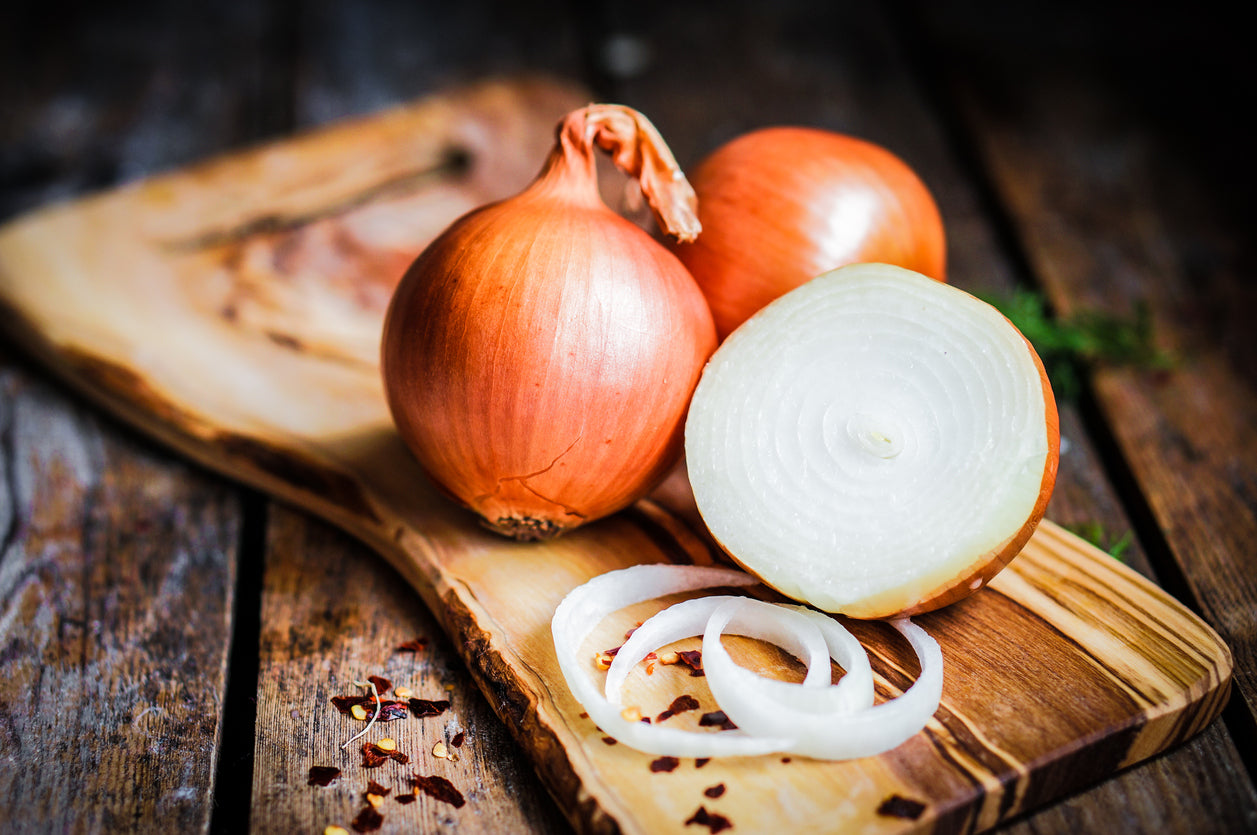“Unpeel” the benefits of onions – 3 ways these flavorful bulbs promote health

If there is one dietary recommendation on which both mainstream and integrative doctors can agree, it’s that “eating the rainbow” (consuming a diet rich in brightly-colored fruits and vegetables) supports health and longevity. Extensive research has shown that intensely-colored fruits and vegetables are loaded with disease-fighting natural plant pigments – and that these can be easily identified by the vibrant colors they impart. For example, orange pumpkins and carrots are high in vision-enhancing pigments known as carotenoids, while ruby-red tomatoes and watermelon are rich in heart-healthy lycopene.
But, what about the less colorful vegetables, such as onions? Do they also have health benefits? As it turns out, they do. Although purple, red and yellow onions have the highest levels of antioxidants and minerals, white onions contain their share of beneficial micronutrients as well. Let’s look at a trio of important onion health benefits.
Stunning research shows that ordinary onions fight cancer
Emerging research has shown that onions have anticancer effects. No less an authority than The American Institute of Cancer Research credits onions (along with other members of the Allium family, such as garlic) with significantly reducing the risk of developing cancer. And, a 2019 study in the Asia Pacific Journal of Clinical Oncology compared 833 people with colorectal cancer with the same number of participants who did not have the disease. The researchers found that regularly eating allium vegetables, such as onions, reduced the risk of colorectal cancer by an eye-opening 79 percent! (That’s huge!)
Scientists believe that onions may owe their anticancer effects to their high levels of antioxidant and anti-inflammatory agents, which include cysteine, kaempferol and chlorogenic acid. These may help reduce unwanted chronic inflammation, while preventing cancer-causing mutations to cell DNA. In addition, some early research has suggested that organosulfur compounds in onions - particularly a substance called onionin A - can slow the growth of tumors.
Onions can lower blood sugar and protect against type 2 diabetes
Onions are an excellent source of flavonoids. In one review, authors noted these flavonoids stimulated the production of pancreatic beta-cells, helping to increase glucose metabolism and insulin secretion. In fact, one study involving people with type 2 diabetes showed that eating 3.5 ounces of fresh red onion reduced fasting blood sugar levels by about 40 mg/dL—a substantial drop – after four hours.
Onions also support healthy blood sugar by “pumping up” levels of glutathione, the body’s most essential detoxifying and health-promoting enzyme. In addition, onions contain prebiotic fiber, which may support weight loss and lower risk of blood sugar imbalances.. With more than 34 million Americans currently affected by diabetes, it’s good to know that regular consumption of onions can reduce the risk.
Support a healthy heart with onions
When it comes to preventing diseases, onions truly are the “gift that keeps on giving.”
In addition to working against cancer and diabetes, onions promote heart health by suppying organosulfur compounds, which may be beneficial for lowering harmful LDL cholesterol. Compounds in onions also help alleviate artery-clogging atherosclerosis by decreasing inflammation and improving endothelial function. As if that weren’t helpful enough, potassium in onions may lower blood pressure, while healthy amounts of folate (vitamin B9) in onions have been shown to promote healthy circulation. Finally, inulin, a fiber found in onions, can help support healthy weight and discourage the obesity and overweight that raise heart disease risk.
Add rich flavor to recipes with onions
Use raw onions to add flavor to salads, hoagies, tacos and dips. Or, sautee and caramelize them for beef, chicken or tofu recipes, use them as a base for French onion soup, or try them grilled, roasted and baked.
For maximum antioxidant content, opt for red and purple onions, which are high in plant pigments known as anthocyanins.
Tip: to reduce the tears that can accompany cutting onions, slice them under running water. And, if onions and garlic aren’t to your personal taste, try milder-flavored members of the super-healthy Allium family, such as chives, shallots and leeks.
While onions are generally recognized as safe, eating excessive amounts can cause gastrointestinal distress for sensitive individuals. And, never share onions with your furry friends - as they can be toxic to dogs, cats and other pets.
Onions not only provide an earthy, rich savor to recipes, but are a fabulous addition to a healthy diet. Which is good news! After all, for many, it would be a dull culinary world without the existence of onions.
Sources for this article include:






